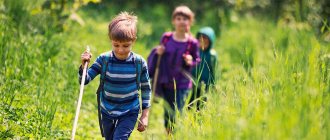The forest is fraught with a lot of mysteries. Wildlife attracts people, and children, more than we, are drawn to everything that is unknown, beautiful and natural. Nature can be not only friendly, but also dangerous. This is why it is so important to explain to children the rules of behavior in the forest before going on a hike.
It is important for adults to know and remember the rules of safe behavior in the forest . Explaining to children, instructing them, and also monitoring compliance with these rules is the task of adults. Remember that the safety (and even the life) of children depends on this. No matter how old the child is, the responsibility for his safety in the forest lies entirely with you, adults!
Detailed instructions on safe behavior in the forest for school-aged children:
A trip to the forest for children is not just a joyful, exciting adventure. These are the very moments that remain in memory forever. And our task, as adults, is to make sure that nothing overshadows childhood memories. Proper organization of the trip, preliminary instructions and supervision by adults will ensure the safety of children and a lot of positive emotions from communicating with the forest
Basic Rules
The duty of every person is to preserve nature . Therefore, our task is to minimize harm to the environment, because we ourselves suffer from this.
A healthy ecosystem is characterized by species diversity, but at the same time, it is also a danger for vacationers. And although wild animals rarely attack people, no one excludes the possibility of stumbling upon a hungry predator. Then outdoor recreation can turn into a negative experience. Thus, compliance with the rules is directly related to human safety.
However, animals are not the only danger. Quiet representatives of the flora pose a much more tangible threat. Unfamiliar berries, shrubs, attractive but poisonous mushrooms. You must not allow this vegetation to deceive you. It's easy to confuse them with safe ones, but the consequences can be dire.
Mushrooms are sometimes called the orderlies of the thicket, because they decompose toxins and regulate the composition of the soil. Roughly speaking, they absorb harmful substances like a sponge, which makes them dangerous to consume. Therefore, before treating yourself to mushroom soup in nature, carefully read whether a particular mushroom can be used for food.
Also check where it grows. Mushrooms growing near contaminants should not be eaten. The same applies to those species that grow near poisonous ones, since they absorb all their toxins and poisons.
Bottom line
Forest safety rules for children, a reminder about which can be printed in advance, must be followed impeccably. If the child has learned everything well, the likelihood of a negative outcome is noticeably reduced.
Parents should take into account that every person who is in the forest can still potentially get lost. No one is completely protected from this. The main task is to give an attitude according to which the child will be able to remain calm, find ways to solve the problem and have the strength to wait for help.
Safe behavior in the forest
What to do if you are going on a nature holiday:
- you need to warn your relatives where you are going;
- be sure to take matches, a knife, a watch and a compass;
- take extra food and water;
- wear bright clothes, preferably with reflectors;
- designate and plan a route in advance;
- if one of your companions is lost, there is no need to panic, just immediately call the rescue group;
- Be sure to take with you the necessary medications, bandages and iodine.
Please also observe the following etiquette:
Don't leave trash behind.
If you leave behind too much waste, bury it in the ground.
Don't leave glass shards behind, or better yet, don't break bottles at all. You can not only endanger forest dwellers, but also injure yourself.
Be extremely careful when starting a fire:
do not make fires near trees;
if you see a place for a fire, then there is no need to create a new one;
Before returning home, put out the remains of the fire behind you;
Why do we need rules of behavior in the forest?
Unfortunately, the ecosystem is quite fragile, and many factors can destroy its stability. Animals are sensitive to the presence of humans and in most cases prefer to observe “strangers” on their territory. You should be careful about any signs of friendliness on their part, as this may mean that the animals see you as a source of food in the future.
The rules were created to avoid such situations. Urbanization has a huge impact on wild and domestic animals. For example, in America, raccoons have learned to find food in garbage.
Human food and household food are dangerous for animals. The fact is that the digestive and nervous systems of animals are structured differently from those of humans. And if something is safe for humans, this does not mean that animals can eat the same foods.
Plastic bags, plates, spoons and forks - all this may seem edible to animals, which will lead to poisoning or death, since the body is not designed to digest such substances. And as you know, they decompose from 50 to 300 years! Thus, compliance with standards protects not only people, but also the ecosystem as a whole.
Rules of behavior in the forest for children
If you are traveling outdoors with children for the first time (this is especially important for preschoolers ), then you must first conduct instructions so that they know how to behave. Here are some rules:
- children should always be with their parents;
- Under no circumstances should you try the berries and mushrooms you find;
- You cannot shout loudly unless necessary;
- if it starts raining with a thunderstorm, then under no circumstances take out your phone;
- harm nature - destroy nests, anthills, break branches;
- touch animals, because they may be sick;
- Do not feed animals by hand.
Instruct your preschool children! They must be under close supervision!
Rules of behavior in the forest in winter
Hiking in winter requires careful preparation, so new rules are added to the previously given ones:
- Choose suitable clothing.
- Be sure to bring a thermos with warm drinks (tea, coffee).
- First of all, choose a safe place. It should protect you from wind and cold.
- Light a fire . Pay attention to the depth of the snow: if it is shallow, then dig a hole for a fire, if it is deep, then build a deck of logs (branches).
- Place your sleeping area 30 centimeters from the fire.
A responsible approach to the rules of behavior in nature guarantees a charge of vigor and joy, regardless of the time of year!
Preparing the children for the hike
Once you have thoroughly prepared yourself, you need to instruct your children on how to behave safely while camping. They begin to prepare children for a forest adventure in advance, telling and explaining what they can do and what they absolutely cannot do. All your “don’ts” should be clear and understandable for children. It’s just that some children perceive the word “you can’t” as “if no one sees, then it’s possible.” Therefore, it is very important not just to ban, but to explain to children everything that can happen to them (and to the forest) if they break the ban. If you are planning to pick mushrooms and berries, you must first introduce children to the names of mushrooms and teach them to distinguish edible mushrooms (berries) from inedible ones.
- For children of middle and high school age, it is enough to have a conversation and distribute a reminder or booklets. Special signs used by foresters and firefighters for the safety of people and wildlife are studied;
- For younger children, the conversation should be repeated and emotionally charged, the booklets more colorful. It wouldn’t hurt to watch a movie and conduct a class hour on the topic “save nature”;
- Preschool children are more emotional, more obedient, but they are also more curious than their older friends. It is much more difficult for them to remember the rules of behavior, which is why preparation for a hike requires a longer period. The memo is replaced by pictures, which the parent or teacher explains in detail. Educational cartoons, fairy tales, and the didactic game “Rules of Conduct in the Forest” are used as means of instructing preschoolers.
Rules of behavior in nature for preschoolers
Rules of behavior in the forest reminder
Remember the main rules:
- Tell your loved ones about your trip. If you get lost, people will look for you.
- Determine your parking location and the time you plan to return home in advance. Try not to wander around.
- Take everything you need: compass, matches, knife, watch and mobile phone (if you have a connection). In view of modern realities, it is worth taking a portable charger with you.
- Prepare more food.
- Bring spare clothes.
- Store matches in a bag to prevent them from getting wet when it rains.
- Wear brightly colored clothing so as not to blend in with the area. If something happens, this will make the search easier.
- Designate landmarks in advance: streams, roads, or perhaps populated areas.
By following these simple rules , you can have an unforgettable time and get a lot of emotions. May this reminder be with you.
Garbage after picnics in the forest
Many people wonder what to do if a hike lasts several days and there is nowhere to put the garbage. In fact, it’s not a good idea to carry it around with you. But there are several life hacks.
First of all, he recommends replacing plastic bags with paper ones. Paper can be used to light a fire. Also, choose reusable dishes to avoid throwing away plastic.
Under no circumstances should you bury or burn plastic waste! Plastic is poisonous to soil and animals. Moreover, it is also flammable, which can cause a fire. Take inorganic “substances” with you.
This is all called a culture of outdoor recreation. She needs to learn herself, and then teach her children. It does not matter whether they are in the first grade or the tenth. Everyone should know “etiquette”!
What to do if you get lost?
In this situation, you cannot panic and run wherever you look. You need to stand still and calm down, and then call for help. If you have not been found, then it’s time to contact the rescue group by calling 112. Try to describe the surrounding situation in as much detail as possible, they will help you get out of the thicket.
Knowledge of parts of the world will be a plus. At exactly noon, turn your back to the sun. Your shadow will indicate the direction of north, east will be on the right, and west will be on the left.
The situation is complicated by the lack of a telephone. In this case, try to listen to the sounds. When you hear voices, road noise, or other signs of people, move there. If you can’t hear anything, then try to find a stream, it will lead you to the river, and where there is a river, there are people.
In a situation where you cannot find your way, it is better to start preparing for the night. Build a simple hut from branches and try to make a fire.
Responsibility for violating the rules of conduct in the forest
According to the Forestry Code of the Russian Federation, violators of the law bear not only administrative, but also criminal liability for the crimes committed. Thus, citizens who caused damage to forests are obliged to compensate for the damage. Otherwise, legal action will be filed against them:
- Illegal hunting threatens the violator with a fine of 200,000 rubles or arrest for six months.
- Destruction of habitats of animals listed in the Red Book is punishable by a fine of 500,000 rubles or up to 3 years of arrest.
- For unauthorized cutting down of forest plantations, the violator will have to pay up to 500,000 rubles or face imprisonment for up to 2 years.
- Destruction of forests is assessed with a fine of 400,000 rubles or arrest for up to 3 years.
Remember that nature is the source of life not only for humans, but also for animals. Our task is to protect and preserve it, and not to destroy it!
We organize the trip correctly
Children are curious and spontaneous creatures. No matter how well they learn the rules of behavior in the forest, once they are “in place” they can simply forget, get confused or get carried away by new experiences. Therefore, all responsibility falls on the shoulders of adults. Safety in the forest depends not only on the rules of behavior, but also on the organization of the trip. Adults should approach this with all seriousness, without missing a single important detail:
- Choosing a location. There are no “unexplored paths”; the hiking location must be safe, repeatedly traveled and known to the adults accompanying the children. You should not go deep into the forest, even if you know these places well. Wildlife is unpredictable.
- It's time to go. Choose the first half of the day for a hike in the forest. Don't forget that it gets dark in the forest earlier than in the city. The approaching twilight may make it difficult for you to get your bearings.
- Provisions. When going on a hike in the forest, take care of a snack. No raw meat - making a fire in a forest area is prohibited and dangerous. Let it be bread, salads, canned food, sausages and cheeses. Don't forget about drinking water. There should be enough of it, as well as food.
- Protection from insects. Everyone knows that there are much more bugs and mosquitoes of all kinds in the forest than in the city. Therefore, the backpack should have ointments, insect repellent sprays, and children (as well as you) should have scarves, panama hats and caps on their heads.
- Ratio of adults to children. There should be a lot of adults. Even if one or two teachers can easily cope with an entire class in the theater and museum, when going into the forest, enlist the support of parents and other teachers. Even the most obedient children in nature, when relaxing, behave more actively. Curiosity pushes children to violate even the strictest prohibitions, so they need to be monitored every minute. The younger the children, the more accompanying persons there should be. For a group of preschoolers, the ratio should ideally be “1 adult to 5 children.”
What to do if your child constantly lies and deceives
In addition, you should have all the necessary items on hand:
- Knife;
- Matches;
- Compass;
- Fully charged phone and portable battery, if available;
- Flashlight;
- First aid kit.



